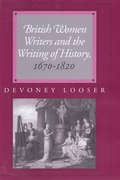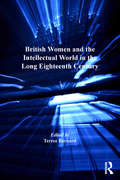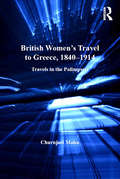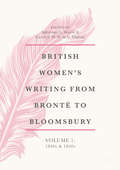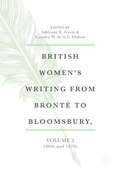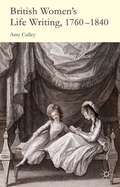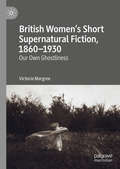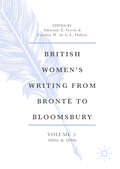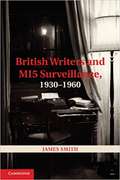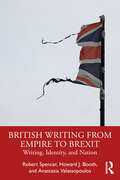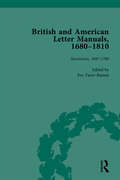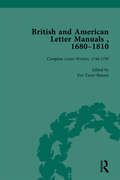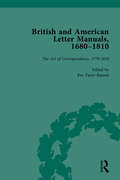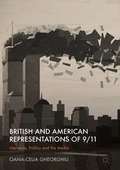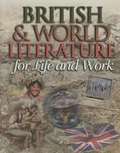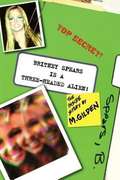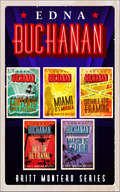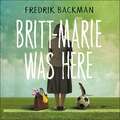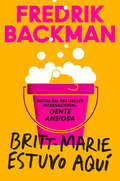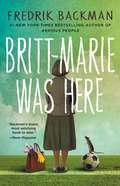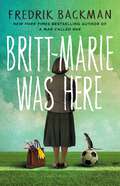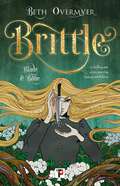- Table View
- List View
British Women Writers and the Writing of History, 1670-1820
by Devoney LooserChosen by Choice Magazine as an Outstanding Academic TitleUntil recently, history writing has been understood as a male enclave from which women were restricted, particularly prior to the nineteenth century. The first book to look at British women writers and their contributions to historiography during the long eighteenth century, British Women Writers and the Writing of History, 1670-1820, asks why, rather than writing history that included their own sex, some women of this period chose to write the same kind of history as men—one that marginalized or excluded women altogether. But as Devoney Looser demonstrates, although British women's historically informed writings were not necessarily feminist or even female-focused, they were intimately involved in debates over and conversations about the genre of history.Looser investigates the careers of Lucy Hutchinson, Lady Mary Wortley Montagu, Charlotte Lennox, Catharine Macaulay, Hester Lynch Piozzi, and Jane Austen and shows how each of their contributions to historical discourse differed greatly as a result of political, historical, religious, class, and generic affiliations. Adding their contributions to accounts of early modern writing refutes the assumption that historiography was an exclusive men's club and that fiction was the only prose genre open to women.
British Women and the Intellectual World in the Long Eighteenth Century (British Literature in Context in the Long Eighteenth Century)
by Teresa BarnardHighlighting the remarkable women who found ways around the constraints placed on their intellectual growth, this collection of essays shows how their persistence opened up attributes of potent female imagination, radical endeavour, literary vigour, and self-education that compares well with male intellectual achievement in the long eighteenth century. Disseminating their knowledge through literary and documentary prose with unapologetic self-confidence, women such as Anna Barbauld, Anna Seward, Elizabeth Inchbald and Joanna Baillie usurped subjects perceived as masculine to contribute to scientific, political, philosophical and theological debate and progress. This multifaceted exploration goes beyond traditional readings of women’s creativity to add fresh, at times controversial, insights into the female view of the intellectual world. Bringing together leading experts on British women’s lives, work and writings, the volume seeks to rediscover women’s appropriations of masculine disciplines and to examine their interventions into the intellectual world. Through their engagement with a unique perspective on women’s lives and achievements, the essays make important contributions to the existing body of knowledge in this important area that will inform future scholarship.
British Women's Travel to Greece, 1840-1914: Travels in the Palimpsest (The\nineteenth Century Ser.)
by Churnjeet MahnBeginning with the publication of the first Murray guidebook to Greece in 1840 and ending with Virginia Woolf's journey to Athens, this book offers a genealogy of British women's travel literature about Greece. Churnjeet Mahn recounts the women's first-hand experiences of the sites and sights of antiquity, analyzing travel accounts by archaeologists, ethnographers, journalists, and tourists to chart women's renderings of Modern Greece through a series of discursive lenses. Mahn's offers insights into the importance of the Murray and Baedeker guidebooks; how knowledge of Greece and Classical Studies were used to justify colonial rule of India at the same time that Agnes Smith Lewis and Jane Ellen Harrison used Greece as a symbol of women's emancipation; British women's production of the first anthropological accounts of Modern Greece; and fin-de-siècle women who asserted their right to see and claim antiquity at the same time that the safety of the independent lady traveler was being called into question by the media.
British Women's Writing from Brontë to Bloomsbury, Volume 1: 1840s and 1850s (British Women’s Writing from Brontë to Bloomsbury, 1840-1940 #1)
by Adrienne E. Gavin Carolyn W. de la L. OultonThis five-volume series, British Women’s Writing From Brontë to Bloomsbury, 1840-1940, historically contextualizes and traces developments in women’s fiction from 1840 to 1940. Critically assessing both canonical and lesser-known British women’s writing decade by decade, it redefines the landscape of women’s authorship across a century of dynamic social and cultural change. With each of its volumes devoted to two decades, the series is wide in scope but historically sharply defined. Volume 1: 1840s and 1850s inaugurates the series by historically and culturally contextualizing Victorian women’s writing distinctly within the 1840s and 1850s. Using a range of critical perspectives including political and literary history, feminist approaches, disability studies, and the history of reading, the volume’s 16 original essays consider such developments as the construction of a post-Romantic tradition, the politicization of the domestic sphere, and the development of crime and sensation writing. Centrally, it reassesses key mid-nineteenth-century female authors in the context in which they first published while also recovering neglected women writers who helped to shape the literary landscape of the 1840s and 1850s.
British Women's Writing from Brontë to Bloomsbury, Volume 2: 1860s and 1870s (British Women’s Writing from Brontë to Bloomsbury, 1840-1940 #2)
by Adrienne E. Gavin Carolyn W. de la L. OultonThis five-volume series, British Women’s Writing From Brontë to Bloomsbury, 1840–1940, historicallycontextualizes and traces developments in women’s fiction from 1840 to 1940. Critically assessingboth canonical and lesser-known British women’s writing decade by decade, it redefines the landscapeof women’s authorship across a century of dynamic social and cultural change. With each ofits volumes devoted to two decades, the series is wide in scope but historically sharply defined.Volume 2: 1860s and 1870s continues the series by historically and culturally contextualizing Victorianwomen’s writing distinctly within the 1860s and 1870s. Covering a range of fictional approaches,including short stories, religiously inflected novels, and comic writing the volume’s 16 original essaysconsider such developments as the sensation craze, the impact of new technologies, and the careeropportunities opening for women. Centrally, it reassesses key nineteenth-century female authors inthe context in which they first published while also recovering neglected women writers who helpedto shape the literary landscape of the 1860s and 1870s.
British Women’s Life Writing, 1760–1840
by Amy CulleyBritish Women's Life Writing, 1760-1840 brings together for the first time a wide range of print and manuscript sources to demonstrate women's innovative approach to self-representation. It examines canonical writers, such as Mary Wollstonecraft, Mary Robinson, and Helen Maria Williams, amongst others.
British Women’s Short Supernatural Fiction, 1860–1930: Our Own Ghostliness
by Victoria MargreeThis book explores women’s short supernatural fiction between the emergence of first wave feminism and the post-suffrage period, arguing that while literary ghosts enabled an interrogation of women’s changing circumstances, ghosts could have both subversive and conservative implications. Haunted house narratives by Charlotte Riddell and Margaret Oliphant become troubled by uncanny reminders of the origins of middle-class wealth in domestic and foreign exploitation. Corpse-like revenants are deployed in Female Gothic tales by Mary Elizabeth Braddon and Edith Nesbit to interrogate masculine aestheticisation of female death. In the culturally-hybrid supernaturalism of Alice Perrin, the ‘Marriage Question’ migrates to colonial India, and psychoanalytically-informed stories by May Sinclair, Eleanor Scott and Violet Hunt explore just how far gender relations have really progressed in the post-First World War period. Study of the woman’s short story productively problematises literary histories about the “golden age” of the ghost story, and about the transition from Victorianism to modernism.
British Women’s Writing from Brontë to Bloomsbury, Volume 3: 1880s and 1890s (British Women's Writing from Brontë to Bloomsbury, 1840–1940 #3)
by Adrienne E. Gavin Carolyn W. de la L. OultonThis five-volume series, British Women’s Writing From Brontë to Bloomsbury, 1840–1940, historically contextualizes and traces developments in women’s fiction from 1840 to 1940. Critically assessing both canonical and lesser-known British women’s writing decade by decade, it redefines the landscape of women’s authorship across a century of dynamic social and cultural change. With each of its volumes devoted to two decades, the series is wide in scope but historically sharply defined. Volume 3: 1880s and 1890s analyses confluences and developments in women’s writing across two fin-de-siècle decades. Its 16 original essays reconsider fiction by canonical and lesser-known women writers, redefining the landscape of female authorship during these decades. By exploring women’s fiction within the social and cultural contexts of the 1880s and 1890s, the collection distils in terms of women’s writing how these decades discretely build on earlier work that is identifiably Victorian. The last two decades of the century, in distinctive ways, witnessed literary experiment, reflection on the limits of realism, and a fruitful sense of confusion about what was ending and what was about to begin.
British Writers and MI5 Surveillance, 1930-1960
by James SmithBritain's domestic intelligence agencies maintained secret records on many left-wing writers after the First World War. Drawing on recently declassified material from 1930 to 1960, this revealing study examines how leading figures in Britain's literary scene fell under MI5 and Special Branch surveillance, and the surprising extent to which writers became willing participants in the world of covert intelligence and propaganda. Chapters devoted to W. H. Auden and his associates, theatre pioneers Ewan MacColl and Joan Littlewood, George Orwell, and others describe methods used by MI5 to gather information through and about the cultural world. The book also investigates how these covert agencies assessed the political influence of such writers, providing scholars and students of twentieth-century British literature an unprecedented account of clandestine operations in popular culture.
British Writers and the Approach of World War II
by Steve EllisThis book considers the literary construction of what E. M. Forster calls 'the 1939 State', namely the anticipation of the Second World War between the Munich crisis of 1938 and the end of the Phoney War in the spring of 1940. Steve Ellis investigates not only myriad responses to the imminent war but also various peace aims and plans for post-war reconstruction outlined by such writers as T. S. Eliot, H. G. Wells, J. B. Priestley, George Orwell, E. M. Forster and Leonard and Virginia Woolf. He argues that the work of these writers is illuminated by the anxious tenor of this period. The result is a novel study of the 'long 1939', which transforms readers' understanding of the literary history of the eve-of-war era.
British Writing from Empire to Brexit: Writing, Identity, and Nation
by Robert Spencer Howard J. Booth Anastasia ValassopoulosThis introduction to British literature from 1900 to 2021 looks at British writing from the perspective of the 2016 Brexit vote and its seismic repercussions. The book covers a wide variety of British literature in order to expose the cultural and political history of Britain, its repeated challenges and highly class-bound, patriarchal structure.British Writing from Empire to Brexit: Writing, Identity, and Nation offers a stark view of what British culture has come to represent, and the repercussions. Not shying away from discussions around imperialism, nationalism, and racism, Robert Spencer, Howard J. Booth, and Anastasia Valassopoulos offer a radical deconstruction of what Britishness can, and should, mean, promoting a convincing and accessible way to rethink the texts and field. The authors analyse novels, poetry, and prose which amplify the dissentient and dissident perspectives of women, gender non-conforming, and queer authors, as well as the varied viewpoints and insights of working-class, immigrant, postcolonial, Black, and Asian writers, showing how these works open up post-national futures after empire and after Brexit.Ultimately offering a model to rescue Britain from its current crises and anxieties, this book is an essential read for anyone approaching the study of British literature and culture, as well as those working on postcolonial studies, decolonisation, recent British history and politics, or with an interest in empire and Brexit.
British and American Letter Manuals, 1680-1810, Volume 2
by Eve Tavor BannetDuring the 18th century, letter manuals became the most popular form of conduct literature. They were marketed to and used by a wide spectrum of society, from maidservants and apprentices, through military officers and merchants, to gentlemen, parents and children. This work presents the most influential manuals from both sides of the Atlantic.
British and American Letter Manuals, 1680-1810, Volume 3
by Eve Tavor BannetDuring the 18th century, letter manuals became the most popular form of conduct literature. They were marketed to and used by a wide spectrum of society, from maidservants and apprentices, through military officers and merchants, to gentlemen, parents and children. This work presents the most influential manuals from both sides of the Atlantic.
British and American Letter Manuals, 1680-1810, Volume 4
by Eve Tavor BannetDuring the 18th century, letter manuals became the most popular form of conduct literature. They were marketed to and used by a wide spectrum of society, from maidservants and apprentices, through military officers and merchants, to gentlemen, parents and children. This work presents the most influential manuals from both sides of the Atlantic.
British and American Representations of 9/11: Literature, Politics and the Media
by Oana-Celia GheorghiuThis book argues that twenty-first-century neorealist fiction is inspired by political and journalistic discourses and, along with them, constitutes one of the many representations of the attacks on September 11 and their outcomes. Adopting a neorealist stance, this book is placed at the intersection of realism and fiction, with often reference to what is perceived as objective writing (media and political texts), not at all so divorced from the practice of literary writings on the event that shook the world on September 11, 2001.
British and World Literature for Life and Work
by Christine Bideganeta Larocco Elaine Bowe JohnsonThe four-volume Literature for Life and Work series continues with British and World Literature for Life and Work(Grade 12). This book challenges students to think critically, work together in teams, and reflect on universal themes by using selections from British and world literature.
Britney Spears Is A Three-headed Alien: The Inside Story
by Mel GildenDear Diary-- I admit it. I've been following Britney Spears' career since she was a Mouseketeer in a training bra. That's why I know something happened to Britney before the MTV Awards. That wasn't Britney up there--and that's not her out there now. No. I have proof. The Britney we know and love is missing. Abducted. Replaced. By a three-headed alien... and now that alien is after me....
Britney Spears, QazaQ Bride
by E. S. Dempsey Kanat MalimThis story is written as a synopsis for a film featuring pop princess Britney Spears. The idea for an adaptation is now being discussed by film producers. The story opens on the Qazaq steppes, with Ataq, the hero of the novel, and his elderly mother, Aina Apa riding a horse caravan to their winter home. In a snow-covered valley they find a woman wounded from a fall with a parachute. Because she suffered numerous contusions and a concussion from the fall, the young woman has lost her memory. She is cared for by these good strangers after a shaman in that area treats her for 3 days. Over time the girl recovers physically, but her memory does not return. Britney becomes the star of Qazaq steppes and eventually Ataq becomes a star before the American people.
Britt Montero Series: Contents Under Pressure; Miami, It's Murder; Suitable for Framing; Act of Betrayal; and Margin of Error (The Britt Montero Mysteries)
by Edna BuchananIn one volume, the first five novels in the &“irresistible series&” starring a Miami crime reporter, from an Edgar Award–nominated author (Kirkus Reviews). Being a crime reporter amid the sun and sin of Miami is a full-time job, one that Cuban-born Britt Montero does better than anyone else. But when you get that close to the criminal underworld, things have a way of sucking you in. In these five novels of suspense, New York Times–bestselling author and Pulitzer Prize–winning reporter Edna Buchanan sets her heroine loose on some of the most highly charged crimes in Miami, and reminds readers that you don&’t necessarily have to live to make the front page . . . Includes: Contents Under Pressure; Miami, It&’s Murder; Suitable for Framing; Act of Betrayal; Margin of Error &“[An] extremely likable heroine.&” —Publishers Weekly
Britt-Marie Was Here
by Fredrik BackmanThe number 1 European bestseller by the author of New York Times bestseller and international phenomenon A Man Called Ove, Britt-Marie was Here is a funny, poignant and uplifting tale of love, community, and second chances.For as long as anyone can remember, Britt-Marie has been an acquired taste. It's not that she's judgemental, or fussy, or difficult - she just expects things to be done in a certain way. A cutlery drawer should be arranged in the right order, for example (forks, knives, then spoons). We're not animals, are we? But behind the passive-aggressive, socially awkward, absurdly pedantic busybody is a woman who has more imagination, bigger dreams and a warmer heart than anyone around her realizes.So when Britt-Marie finds herself unemployed, separated from her husband of 20 years, left to fend for herself in the miserable provincial backwater that is Borg - of which the kindest thing one can say is that it has a road going through it - and somehow tasked with running the local football team, she is a little unprepared. But she will learn that life may have more to offer her that she's ever realised, and love might be found in the most unexpected of places.(P)2016 Hodder & Stoughton Ltd.
Britt-Marie Was Here \ Britt-Marie estuvo aquí (Spanish edition)
by Fredrik BackmanFredrik Backman, el autor bestseller de Gente ansiosa, nos trae una novela emocionante, tierna y graciosa que celebra la importancia de la comunidad y de las conexiones entre las personas en un mundo que a veces intenta alejarnos los unos de los otros.Tras dejar a su esposo infiel, Britt-Marie encuentra trabajo como encargada en el casi clausurado centro cívico de Borg, un abandonado y ruinoso pueblo del que lo único bueno que puede decirse es que tiene una carretera. Esta quisquillosa mujer se verá envuelta en la vida de sus nuevos vecinos, un grupo de malhechores, borrachos y holgazanes que le demostrarán que la vida va más allá de tener un cajón de los cubiertos ordenado.Pero su reto más grande aún está por venir: se enfrentará a la imposible tarea de entrenar al equipo de fútbol juvenil del pueblo para alzarse con la copa que se jugará en pocos días. ¿Podrá Britt-Marie encontrar por fin su lugar en el mundo en este pueblo de inadaptados?FREDRIK BACKMAN es autor de nueve libros, entre ellos el bestseller internacional Un hombre llamado Ove, cuya versión cinematográfica fue candidata a dos Óscar. Sus obras se han traducido a cuarenta y seis idiomas. Backman vive en Estocolmo con su esposa y sus dos hijos.
Britt-Marie Was Here: A Novel
by Fredrik BackmanThe New York Times bestselling author of A Man Called Ove, My Grandmother Asked Me to Tell You She&’s Sorry, and Anxious People captivates readers with this &“warm and satisfying&” (People) story &“about a woman rediscovering herself after a personal crisis…fans of Backman will find another winner in these pages&” (Publishers Weekly).Britt-Marie can&’t stand mess. A disorganized cutlery drawer ranks high on her list of unforgivable sins. She is not one to judge others—no matter how ill-mannered, unkempt, or morally suspect they might be. It&’s just that sometimes people interpret her helpful suggestions as criticisms, which is certainly not her intention. But hidden inside the socially awkward, fussy busybody is a woman who has more imagination, bigger dreams, and a warmer heart that anyone around her realizes. When Britt-Marie walks out on her cheating husband and has to fend for herself in the miserable backwater town of Borg—of which the kindest thing one can say is that it has a road going through it—she finds work as the caretaker of a soon-to-be demolished recreation center. The fastidious Britt-Marie soon finds herself being drawn into the daily doings of her fellow citizens, an odd assortment of miscreants, drunkards, layabouts. Most alarming of all, she&’s given the impossible task of leading the supremely untalented children&’s soccer team to victory. In this small town of misfits, can Britt-Marie find a place where she truly belongs? Funny and moving, sweet and inspiring, Britt-Marie Was Here celebrates the importance of community and connection in a world that can feel isolating.
Britt-Marie Was Here: from the bestselling author of A MAN CALLED OVE
by Fredrik BackmanThe number 1 European bestseller by the author of New York Times bestseller and international phenomenon A Man Called Ove, Britt-Marie was Here is a funny, poignant and uplifting tale of love, community, and second chances.For as long as anyone can remember, Britt-Marie has been an acquired taste. It's not that she's judgemental, or fussy, or difficult - she just expects things to be done in a certain way. A cutlery drawer should be arranged in the right order, for example (forks, knives, then spoons). We're not animals, are we? But behind the passive-aggressive, socially awkward, absurdly pedantic busybody is a woman who has more imagination, bigger dreams and a warmer heart than anyone around her realizes.So when Britt-Marie finds herself unemployed, separated from her husband of 20 years, left to fend for herself in the miserable provincial backwater that is Borg - of which the kindest thing one can say is that it has a road going through it - and somehow tasked with running the local football team, she is a little unprepared. But she will learn that life may have more to offer her that she's ever realised, and love might be found in the most unexpected of places.
Britt-Marie Was Here: from the bestselling author of A MAN CALLED OVE
by Fredrik BackmanFROM THE INTERNATIONAL BESTSELLING AUTHOR OF A MAN CALLED OVE, NOW A MAJOR FILM STARRING TOM HANKSThe number one bestseller: a funny, poignant and uplifting tale of love, community, and second chancesFor as long as anyone can remember, Britt-Marie has been an acquired taste. It's not that she's judgemental, or fussy, or difficult - she just expects things to be done in a certain way. A cutlery drawer should be arranged in the right order, for example (forks, knives, then spoons). We're not animals, are we? But behind the passive-aggressive, socially awkward, absurdly pedantic busybody is a woman who has more imagination, bigger dreams and a warmer heart than anyone around her realizes.So when Britt-Marie finds herself unemployed, separated from her husband of 20 years, left to fend for herself in the miserable provincial backwater that is Borg - of which the kindest thing one can say is that it has a road going through it - and somehow tasked with running the local football team, she is a little unprepared. But she will learn that life may have more to offer her that she's ever realised, and love might be found in the most unexpected of places.'Impressive and heart-warming . . . there are unexpected delights to being stuck with Britt-Marie' Literary Review
Brittle (Blade and Bone)
by Beth OvermyerReaders of Carissa Broadbent will love this thrilling new series, from the author of The Goblets Immortal, weaving an intriguing world of fantasy and folklore.After the murder of her father – which no one but her believes happened – Verve just wants to hold her family together and take on the role of provider. Unfortunately, a cruel fae lord believes she knows the location of an ancient magical weapon and steals her away to Letorheas, realm of the fairies. The fae lord seems to want something from Verve that goes beyond the weapon, something that many doubt she can provide. Verve must find a way to navigate the strangeness of Letorheas and embrace a destiny more intertwined with the fae than she would like to believe.FLAME TREE PRESS is the imprint of long-standing independent Flame Tree Publishing, dedicated to full-length original fiction in the horror and suspense, science fiction & fantasy, and crime / mystery / thriller categories. The list brings together fantastic new authors and the more established; the award winners, and exciting, original voices. Learn more about Flame Tree Press at www.flametreepress.com and connect on social media @FlameTreePress
